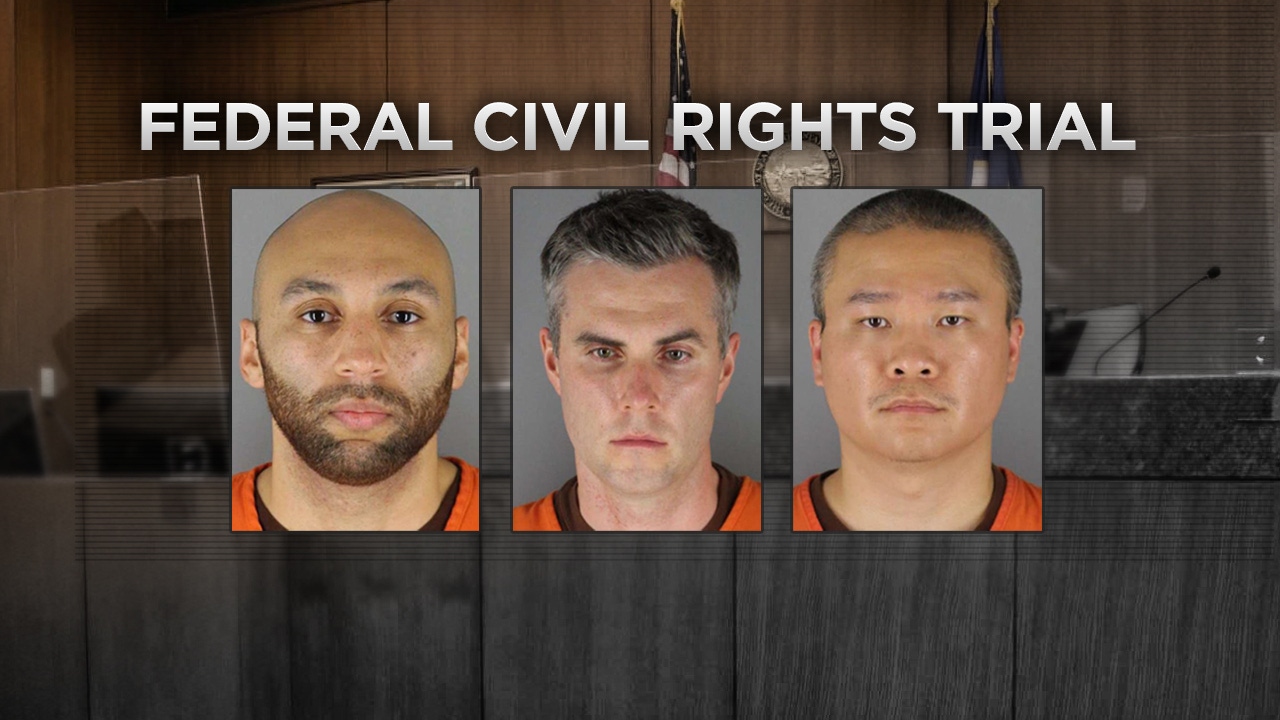MPD’s longest-serving officer: 3 ex-officers should’ve intervened, helped Floyd
[anvplayer video=”5088789″ station=”998122″]
Testimony continued Thursday in the federal trial of three former Minneapolis police officers charged with violating George Floyd’s civil rights.
The morning began with the defense cross-examining BCA Forensic Scientist McKenzie Anderson. The defense honed in on why Anderson didn’t test some pill fragments found in Floyd’s vehicle until months later; when tested, the pills came back as methamphetamine and fentanyl. Anderson insisted that the BCA had no information to look for any controlled substances and they mainly were searching for blood and personal items.
Prosecutors also said their case is coming to an end as they only expect to call around five more witnesses before resting their case. That means the defense could take over as soon as Friday afternoon or Monday.
The next witness called was MPD Lt. Richard Zimmerman, the head of the homicide department and the longest-serving sworn MPD officer. He testified that officers have a duty to intervene upon seeing “too much force” or a need for first aid.
“You have a duty to protect the public,” Zimmerman said.

“There’s no time on the job limit … we all wear the same badge and have the same responsibility,” he added.
Jurors also got to see a segment of body camera video from Lane when Zimmerman asked him about what happened at the scene.
Zimmerman testified that, after talking to Kueng and Lane, he “thought perhaps it was a drug overdose,” adding, “What they told me and what was on the video is totally different, in my viewing of it.”
The lieutenant repeatedly said the officers should have intervened and provided aid to Floyd but failed to do so, pointing out Floyd was in their custody, meaning they were responsible for him.
“When a person is in distress medically, they say they can’t breathe or you can’t get a pulse, you need to start first aid, CPR, put them in a recovery position. You need to try something until an ambulance arrives,” Zimmerman said.
While the defense has pointed to Chauvin’s role in dismissing the other officers’ suggestions, Zimmerman testified that Chauvin’s actions aren’t an excuse for the lack of actions from the other officers.
“When you see that somebody is being in need of medical aid and another officer might not … allow that or won’t allow that or whatever, you still have to intervene and by that I mean you have to take an action to push the officer off of a person if that’s the case,” Zimmerman said.
He also didn’t excuse Kueng or Lane for their lack of action because of their inexperience.
“When we take our oath to be police officers & they pin the badge on us, it doesn’t mean that you get a free pass for a day, or a week, or six months or a year, it means that you’re responsible for a person’s safety just as much as I would be,” Zimmerman said.
The defense countered by highlighting some discrepancies in what Zimmerman said Thursday and previously. They also asked about critical incident policy, particularly who officers should talk to at the scene. The defense argued Zimmerman shouldn’t have been questioning the officers, based on that policy, which the lieutenant disputed.
When prosecutors asked about bystanders at the scene, Zimmerman replied, “With what they were saying, it appeared to me they were offering more intervention than the police officers were.”
Court is set to reconvene at 9:30 a.m. Friday.
[anvplayer video=”5088753″ station=”998122″]
KSTP Reporter Callan Gray provided live updates of Thursday’s proceedings below.
Tweets by CallanGrayNewsThursday, a forensic scientist with the Minnesota Bureau of Criminal Apprehension (BCA) crime lab is expected to continue testifying in a federal trial involving three former officers charged with violating George Floyd’s civil rights.
Thomas Lane, J. Alexander Kueng and Tou Thao are accused of depriving Floyd of his rights when they failed to give him medical aid as Officer Derek Chauvin knelt on Floyd’s neck for 9 1/2 minutes in 2020.
BCA forensic scientist McKenzie Anderson—who oversaw the processing of Lane and Kueng’s squad car and the Mercedes SUV that Floyd was driving—testified Wednesday that pills and pill fragments found in the Mercedes tested positive for methamphetamine.
RELATED: ER doctor & toxicologist, BCA forensic scientist testify
A toxicologist testified that drug use did not cause Floyd’s death after officers pinned him to the pavement in May 2020.
Anderson is expected to face questions from defense attorneys Thursday.
KSTP’s complete George Floyd coverage
Stay with 5 EYEWITNESS NEWS and KSTP.com for trial updates throughout the day.